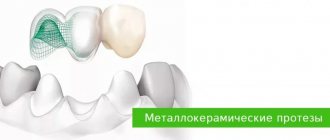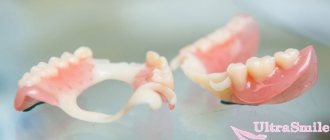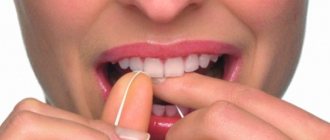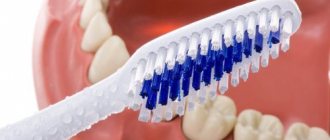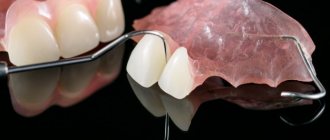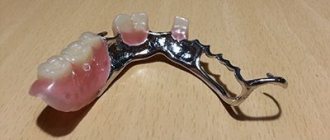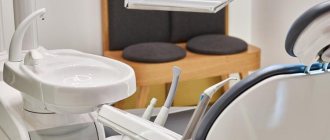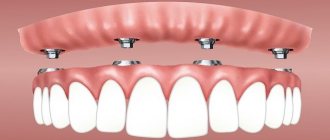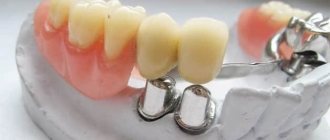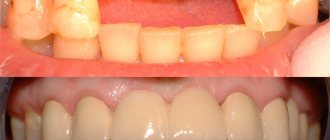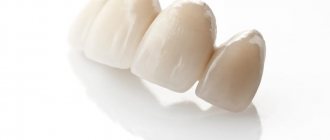- Date of: 25.04.2017
- Author: adekstom
- In: Useful articles
Dental prosthetics is a very popular service in dentistry. This technology is used to restore dentition, because the loss of one tooth can lead to the loosening and loss of others. Prosthetics restore the functions of the masticatory apparatus and also restore the aesthetic appearance of your smile. However, before this procedure, you should learn more about the manufacture of dentures, their repair, as well as the materials from which they are made. This article will help you understand the main aspects of this issue and make the right decision.
Types of prosthetics
Dentures are removable and non-removable:
- Non-removable structures are those that the patient cannot remove on his own. These are bridges and crowns. They are used to replace lost teeth. The design of these prostheses is quite complex. It is complemented by supporting crowns. For the manufacture of such dentures, reliable and durable materials are used that can withstand heavy loads. These structures can be either soldered or solid.
- Removable dentures are so called because the patient can remove them independently. Such installations can be complete or partial. This type of design consists of three main parts. These are, firstly, fastening elements, and secondly, artificial teeth. The basis of such an installation is the basis. With the help of the base it is fixed to the gum.
To attach complete dentures, materials that have suction properties are used. If you have healthy teeth, everything can be fixed more securely. For this purpose, locking connections or clasps are used. Clasp dentures are one of the types of removable structures. They are more durable in operation. Therefore, production is more complex and painstaking. Metal in the form of an arc frame is the basis for this installation. The artificial teeth are fixed on the base.
Prices
Free online consultation with a dentist
| Service | Price |
| Installation of a metal-ceramic crown (Germany Ivoclar, cobalt-chrome) | from 15,000 rub. |
| Installation of a metal-ceramic crown on a single one-stage implant of the ROOTT system - stage II, cement fixation (SHOFU ceramics, Japan) | from 23,000 rub. |
| Installation of a metal-ceramic crown based on a bio-alloy - gold (Ivoclar Germany + cost of material according to the certificate) | from 25,000 rub. |
| Installation of a metal-ceramic crown on a single one-stage implant of the ROOTT multi-unit system with screw fixation - stage II (SHOFU ceramics, Japan) | from 28,000 rub. |
| Installation of a metal-ceramic crown on a classic implant of the ROOTT system (ceramics IVOCLAR, Germany, cobalt-chrome), cement fixation | from 28,000 rub. |
| Installation of a metal-ceramic crown on a classic implant of the ROOTT system (SHOFU ceramics, Japan, cobalt-chrome), cement fixation | from 30,000 rub. |
| Installation of a metal-ceramic crown on a classic implant of the ROOTT multi-unit system with screw fixation (ceramics IVOCLAR, Germany, cobalt-chrome) | from 32,000 rub. |
| Installation of a metal-ceramic crown on a classic implant of the ROOTT multi-unit system with screw fixation (SHOFU ceramics, Japan, cobalt-chrome), cement fixation | from 34,000 rub. |
| Installation of a metal-ceramic crown on a classic implant of the Nobel system (Sweden, Nobel Biocare) with cement fixation | from 40,000 rub. |
| Installation of a metal-ceramic crown on a classic implant of the Nobel system (Sweden, Nobel Biocare) with screw fixation | from 44,000 rub. |
| Installation of a complete metal-ceramic bridge prosthesis on one-stage implants of the ROOTT system on a metal frame, 1 jaw, cemented fixation | from 210,000 rub. from 250,000 rub. promotion |
| Installation of a complete metal-ceramic bridge prosthesis on one-stage implants of the ROOTT multi-unit system with screw fixation, 1 jaw, metal frame | from 230,000 rub. from 270,000 rub. promotion |
Consultation and diagnostics are free!
All prices Promotions
Manufacturing technology
Before starting prosthetics, the dentist carries out the necessary preparation. To begin with, the teeth and gums are very thoroughly cleaned of plaque and deposits. If necessary, dental treatment is performed. When the preparatory stage is completed, the taking of impressions for the manufacture of a denture begins. A special spoon, also called an impression tray, is inserted into the patient’s mouth. It contains a plastic mass from which the impression is made.
After this, the impression is sent to the dental technician. In a specialized laboratory, a plaster base is made based on the impression. The gypsum has all the necessary contours to create an anatomically accurate structure.
One of the manufacturing methods is stamping. However, today this method is considered outdated and is rarely used. This was due to the fact that the prostheses made in this way did not correspond to the anatomical features of each patient.
Modern dentistry uses the casting method. This method is more effective and convenient, but also more expensive. This technology is more complicated, but allows you to make very precise, high-quality designs. This is how clasp dentures are made.
Timing of prosthetics on implants
If the patient chose implantation to restore teeth, the final stage may occur in six months or longer. This is due to the fact that before the installation of prostheses you have to undergo several procedures and operations. In particular, when using the classical technique, before obtaining the final result it is necessary:
- insert artificial roots into the jaw - implants;
- wait until the rods are overgrown with bone tissue and stabilized;
- undergo the second surgical stage of implantation to install the former;
- after two weeks, install the abutment and take impressions to make the crown;
- do a fitting and, if necessary, correction of the prosthesis.
After all these manipulations, the time comes to install a permanent artificial tooth. The general time frame for prosthetics, including implantation, in this case can range from four to seven months.
Materials for dental prosthetics
Various materials are used to make dentures. These can be various metals, plastics, nylon, composite materials, cermets and ceramics.
Safe, but very expensive are gold, as well as alloys of palladium or platinum. These materials are perfect for ceramic inserts.
Some alloys, on the contrary, can cause allergies. Like, for example, an alloy of chromium and nickel or cobalt. Although it is worth noting that these materials also have their advantages.
Zirconium oxide looks attractive . This material is perfect for front teeth. Titanium is one of the best options for dental prosthetics. It is biologically neutral, does not cause allergies and is wear-resistant.
An inexpensive, accessible and reliable material is plastic . Despite many advantages, plastic also has its disadvantages. This material absorbs odors and changes color when exposed to dyes and bacteria in the oral cavity.
Nylon is becoming increasingly popular. It is reliable in operation, fastens well and is completely harmless. Nylon is not subject to deformation and is resistant to moisture. This is an excellent choice of material for prosthetics.
Ceramics is a material that is very similar to natural teeth. With its help you can hide imperfections. Metal ceramics have greater strength and are much more reliable; they are not afraid of mechanical loads.
Composite materials are used to give the tooth the required shape. They represent polymer compounds. With their help you can restore a tooth.
Which removable dentures are best?
Each of the dentures has its own competitive features, advantages and nuances:
- It is believed that nylon removable dentures are more comfortable for patients to wear, they are soft, bend well, and do not provoke allergies and irritation;
- if dropped on a hard surface, the base of nylon removable dentures will not be damaged, but acrylic analogues risk cracking;
- Also, acrylic dentures are much more durable, they are better fixed to the mucous membrane of the human oral cavity.
Each person may have personal characteristics in adapting the prosthesis. Thus, at the stage of planning prosthetics, a person does not yet know whether he will be satisfied with the aesthetics and quality of chewing food with the help of an installed removable denture. The listed factors are individual - everything comes in comparison and after some time, until the final adaptation to the removable denture occurs.
Of course, removable dentures are not as comfortable as dental implants and permanent bridges, but the latter two options are much more expensive. For older people, removable dentures are a reasonable and affordable solution to the problem of completely missing teeth.
Repair of dentures
They try to make dentures durable and wear-resistant. Such that they can withstand prolonged mechanical stress and not break. Despite this, sometimes even the best quality prostheses break. The worst thing is when their base cracks.
The causes of breakdowns can be very diverse:
- Poor quality. The most common reason. The design may break because it was made incorrectly, from low-quality materials or without meeting technological requirements.
- Loose fit to the gum. If the denture does not fit well to the gum, this leads to its loosening, which can also cause breakage.
- Loss of an abutment tooth A denture may become unusable if the abutment tooth that supported the structure falls out. The dental unit may develop defects or cracks.
- Incorrect use of the prosthesis. In addition to manufacturing errors, the cause of failure can be the incorrect use of this installation. It may be subject to too much stress or mechanical stress.
- Lack of proper care. The oral cavity after prosthetics requires careful care. Neglecting basic hygiene rules can lead to the structure becoming unusable.
In addition, the service life of the prosthesis may simply end. After a certain period has expired, another should be done.
Breakage very often leads to the fact that the prosthesis can no longer be used. But there are also cases when you can limit yourself to repairs. A minor breakdown in a metal-ceramic installation can be fixed in one day.
To repair and solve the problem, you should seek help from a dental technician. He is the one who knows how to fix this or that structure. For repairs, he uses special substances and resins that can glue the damaged prosthesis and it will be like new. If a tooth falls off from the nylon structure, the technician can make a new one and restore the integrity of the denture.
Repairs begin with cleaning. First, the entire structure must be cleaned of dirt. Next comes the damage assessment. If they are not serious, you can use glue; more complex cases require more thorough repairs. If the denture has changed color, it can be easily corrected and soon your smile will shine again.
Some people believe that they can do the repairs themselves, but without proper education and materials, you can ruin the prosthesis and even harm your health. The work of repairing damaged structures should be left to a specialist. After all, he uses a special glue that does not harm the body, and you cannot use it at home.
If the denture is not repaired correctly, parts may break off. This could cause serious injury. Therefore, it is better to entrust repairs to a professional.
The beauty of your smile is in our hands
This Personal Data Privacy Policy (hereinafter referred to as the Privacy Policy) applies to all information that the site located on the Internet at the address (on the domain name): https://www.clinicperfect.ru/ (hereinafter referred to as the Site) can receive about the User during the latter’s use of the Site and its services. 1. Terms and definitions used in the Privacy Policy
In the Privacy Policy, unless otherwise expressly stated in the text, the following words and expressions have the following meanings:
1.1. A website is a set of computer software and hardware that ensures the publication for public viewing of information and data, united for a common purpose, through technical means used for communication between computers on the Internet, operating through an Internet resource and related services. The Site in this Agreement means the Site on which a unified system for registration and authorization of users is located, located on the Internet at the address (domain name): https://www.clinicperfect.ru/
1.2. Site Administrator - persons authorized by the owner of the Site to manage the Site, acting on behalf of Digital Dentistry Clinic "Perfect" LLC
The owner of the Site is the limited liability company Digital Dentistry Clinic “Perfect” LLC Address: 214019 Smolensk region, Smolensk Tramway proezd, 4, office No. 14
1.3. User - a person using the Internet and, in particular, the Site, who has completed the registration procedure on the Site in order to access online ordering of services presented on the Site and has his own personal page (profile/account), as well as a person using the Site without completing the registration procedure for informational and similar purposes.
1.4. Personal data - any information relating to a directly or indirectly identified or identifiable individual (subject of personal data).
1.5. Processing of personal data - any action (operation) or set of actions (operations) performed using automation tools or without the use of such tools with personal data, including collection, recording, systematization, accumulation, storage, clarification (updating, changing), extraction, use, transfer (distribution, provision, access), depersonalization, blocking, deletion, destruction of personal data.
1.6. Confidentiality of personal data is a requirement for the Site Owner and (or) Site Administrator or other person who has access to personal data to comply with the requirement not to allow their distribution without the consent of the subject of personal data or the presence of another legal basis.
1.7. Cookies are a small piece of data sent by a web server and stored on the User’s computer, which a web client or web browser sends to the web server every time in an HTTP request when trying to open a page of the corresponding site.
1.8. IP address is a unique network address of a node in a computer network built using the IP protocol.
2. GENERAL PROVISIONS
2.1. The User's use of the Site constitutes agreement with this Privacy Policy and the terms of processing of the User's personal data.
2.2. In case of disagreement with the terms of the Privacy Policy, the User must stop using the Site.
2.3. This Privacy Policy applies only to the Site named in clause 1.1. of this Privacy Policy, located at the address (on the domain name): https://www.clinicperfect.ru/. The Site Administrator and the Site owner do not control and are not responsible for third party sites that the User can access via links available on the Site.
2.4. The Site Administrator and the Site Owner do not verify the accuracy of the personal data provided by the Site User.
3. SCOPE OF THE PRIVACY POLICY
3.1. This Privacy Policy establishes the obligations of the Site Owner and the Site Administrator to non-disclose and ensure a regime for protecting the confidentiality of personal data that the User provides at the request of the Site when registering on the Site.
3.2. Personal data permitted for processing under this Privacy Policy is provided by the User by filling out the registration form on the Site in the “Registration” section and includes the following information:
3.2.1. Last name, first name, patronymic of the User;
3.2.2. User's contact phone number;
3.2.3. Email address (e-mail);
3.2.4. Place of residence of the User (if necessary).
3.3. The site protects data that is automatically transmitted during viewing of advertising blocks and when visiting pages on which the system’s statistical script (“pixel”) is installed:
— IP address; — information from cookies;
— information about the browser (or other program that provides access to display advertising);
— access time; — address of the page on which the advertising unit is located;
— referrer (address of the previous page);
— geolocation.
3.4. Disabling cookies may result in the inability to access parts of the Site that require authorization.
3.5. The site collects statistics about the IP addresses of its Users. This information is used to identify and solve technical problems and to monitor the legality of financial payments.
3.6. Any other personal information not specified above (browsers and operating systems used, etc.) is subject to secure storage and non-distribution, except for the cases provided for in clauses 5.2. and 5.3. of this Privacy Policy.
4. PURPOSES OF COLLECTING USER’S PERSONAL INFORMATION
4.1. The Site Administrator and the Site Owner may use the User’s personal data for the purposes of:
4.1.1. Identification of the User registered on the Site for placing an order and (or) concluding an Agreement for the sale and purchase of goods remotely.
4.1.2. Providing the User with access to personalized resources of the Site.
4.1.3. Establishing feedback with the User, including sending notifications, including electronic ones, requests regarding the use of the Site, provision of services, processing requests and applications from the User.
4.1.4. Determining the location of the User to ensure security and prevent fraud.
4.1.5. Confirmation of the accuracy and completeness of personal data provided by the User.
4.1.6. Creating an account for making purchases, if the User has agreed to create an account.
4.1.7. Notifications to the Site User about the status of the order.
4.1.8. Processing and receiving payments, confirming taxes or tax benefits, disputing a payment.
4.1.9. Providing the User with effective customer and technical support if problems arise related to the use of the Site.
4.1.10. Providing the User with his consent, product updates, special offers, pricing information, newsletters and other information on behalf of the Site or on behalf of affiliates of the Site Owner.
4.1.11. Carrying out advertising activities with the consent of the User.
4.1.12. Providing the User with access to sites or services of affiliates of the Site Owner in order to receive products, updates and services.
5. METHODS AND TERMS OF PROCESSING PERSONAL INFORMATION
5.1. The processing of the User's personal data is carried out without a time limit, in any legal way, including in personal data information systems using automation tools or without the use of such tools.
5.2. The User agrees that the Site Administrator and the Site Owner have the right to transfer personal data to third parties, in particular, courier services, postal organizations, telecommunication operators, solely for the purpose of fulfilling the User’s order placed on the Site, including delivery of goods.
5.3. The User's personal data may be transferred to authorized government bodies of the Russian Federation only on the grounds and in the manner established by the legislation of the Russian Federation.
5.4. In case of loss or disclosure of personal data, the Site Administrator or the Site Owner informs the User about the loss or disclosure of personal data.
5.5. The Site Administrator or the Site Owner takes the necessary organizational and technical measures to protect the User’s personal information from unauthorized or accidental access, destruction, modification, blocking, copying, distribution, as well as from other unlawful actions of third parties.
5.6. The Site Administrator or the Site Owner, together with the User, takes all necessary measures to prevent losses or other negative consequences caused by the loss or disclosure of the User’s personal data.
6. OBLIGATIONS OF THE PARTIES
6.1. The user is obliged:
6.1.1. Provide information about personal data necessary to use the Site.
6.1.2. Update, supplement the provided information about personal data if this information changes.
6.2. The Site Administrator or Site Owner is obliged to:
6.2.1. Use the information received solely for the purposes specified in clause 4 of this Privacy Policy.
6.2.2. Ensure that confidential information is kept secret, not disclosed without the prior written permission of the User, and also not sell, exchange, publish, or disclose in other possible ways the transferred personal data of the User, except for the cases provided for in clauses 5.2. and 5.3. of this Privacy Policy.
6.2.3. Take precautions to protect the confidentiality of the User's personal data in accordance with the procedure usually used to protect this type of information in existing business transactions.
6.2.4. Block personal data relating to the relevant User from the moment of application or request from the User or his legal representative or the authorized body for the protection of the rights of personal data subjects for the period of verification, in the event of detection of unreliable personal data or unlawful actions.
7. RESPONSIBILITY OF THE PARTIES
7.1. The Site Administrator or the Site Owner of the site, who have not fulfilled their obligations, are liable for losses incurred by the User in connection with the unlawful use of personal data, in accordance with the legislation of the Russian Federation, except for the cases provided for in clauses 5.2., 5.3. and 7.2. of this Privacy Policy.
7.2. In case of loss or disclosure of confidential information, the Site Administrator or the Site Owner shall not be liable if this confidential information:
7.2.1. Became public domain until it was lost or disclosed.
7.2.2. Was received from a third party prior to its receipt by the Site Administrator or Site Owner.
7.2.3. Was disclosed with the consent of the User.
8. DISPUTE RESOLUTION
8.1. Before going to court with a claim on disputes arising from the relationship between the Site User and the Site Administrator or the Site Owner, it is mandatory to submit a claim (a written proposal for a voluntary settlement of the dispute).
8.2. The recipient of the claim, within 30 calendar days from the date of receipt of the claim, notifies the claimant in writing about the results of consideration of the claim.
8.3. If an agreement is not reached, the dispute will be referred to a judicial authority in accordance with the current legislation of the Russian Federation.
8.4. The current legislation of the Russian Federation applies to this Privacy Policy and the relationship between the User and the Site Administrator or the Site Owner.
9. ADDITIONAL TERMS
9.1. The Site Administrator or the Site Owner has the right to make changes to this Privacy Policy without the consent of the User.
9.2. The new Privacy Policy comes into force from the moment it is posted on the Site, unless otherwise provided by the new edition of the Privacy Policy.
Manufacturing time for dentures
Many patients are interested in the time it takes to manufacture a prosthetic installation. The timing may vary, depending on both the material and the type of fixation. The structure can be fixed on a pin, implant or natural tooth.
It is difficult to give an exact time for making a denture. It depends on how busy the dental technician is, on the type of material and method of attachment. If the laboratory load is low, the approximate production time for any installation can be reduced.
Nylon dentures take about 7 or 10 days to complete on average, as do aluminum or zirconia crowns. For plastic you need 5 or 10. Approximately the same period will be needed for metal-ceramics and metal-plastic. Metal and ceramic crowns will require 4 to 7 days.
Clasp dentures take the longest to produce. The timing of their production depends on the method of fastening. Prostheses with hooks are made in 12 days, with attachments from 20 days. The same amount is spent on structures with telescopic crowns.
We hope that this information about materials, technologies and production times for dentures will help you avoid many mistakes when choosing a denture. And knowledge about possible damage and repairs will help extend its service life and not harm your health.
